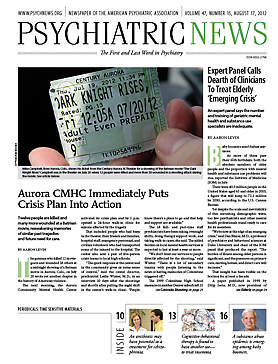The mental health effects associated with prolonged solitary confinement demand close consideration and should influence any future policy on use of the practice in U.S. prisons.
So asserted APA Medical Director James H. Scully Jr., M.D., in testimony submitted in June in advance of a congressional hearing on the human-rights, fiscal, and public-safety consequences of solitary confinement.
Held before the Senate Judiciary Subcommittee on the Constitution, Civil Rights, and Human Rights, the hearing featured testimony from federal and state law enforcement officials, academics, and advocates, including Craig Haney, Ph.D., J.D., a professor of psychology at the University of California, Santa Cruz, and Anthony Graves, an exonerated former death-row inmate who spent the majority of his 18 years at a Texas prison in solitary confinement.
“I lived under the rules of a system that is literally driving men out of their minds,” said Graves in describing the inhumane conditions of serving time in a small cell without access to human interaction or proper medical care. “No one can begin to imagine the psychological effects isolation has on another human being.”
According to recent estimates from the Web-based advocacy project Solitary Watch, approximately 82,000 inmates are currently segregated in federal and state prison systems in the United States. And a 2010 study published by the American Academy of Psychiatry and the Law (AAPL) concluded that segregation over prolonged periods of time has the capacity to induce harmful psychological effects such as anxiety, anger, cognitive disturbance, perceptual distortion, obsessive thoughts, paranoia, and psychosis.
The AAPL study also estimated that between 8 percent and 19 percent of current U.S. prisoners suffer from psychiatric disorders, with an additional 15 percent to 20 percent of prisoners requiring some form of psychiatric intervention during incarceration. These individuals, according to AAPL’s findings, often require costly psychiatric hospitalization or crisis-intervention services, and face a heightened risk of suicide.
In addition to underscoring the need for a rethinking of solitary-confinement practices, these statistics reflect the current dearth of segregation-unit psychiatric physicians capable of treating prisoners living in such extreme conditions, Scully emphasized in his testimony.
“APA believes that any initiative to address the practice of solitary confinement in the United States must also address the physician’s ethical responsibility to provide the highest level of medical and mental health care to incarcerated patients,” Scully said. “This entails greater investments in the psychiatric physician workforce, enhanced efforts to educate all physicians about correctly diagnosing and treating mental illness, and repurposed space in prison segregation units that ensures that patients receive appropriate confidential evaluation, consultation, and treatment services.”

